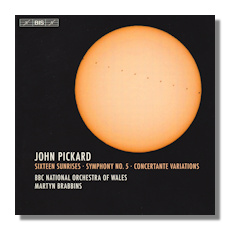
The Internet's Premier Classical Music Source
Related Links
-
Pickard Reviews
- Latest Reviews
- More Reviews
-
By Composer
-
Collections
DVD & Blu-ray
Books
Concert Reviews
Articles/Interviews
Software
Audio
Search Amazon
Recommended Links
Site News
 SACD Review
SACD Review
John Pickard

Sixteen Sunrises
- Symphony #5
- Sixteen Sunrises
- Concertante Variations
- Toccata (Monteverdi)
BBC National Orchestra of Wales/Martyn Brabbins
BIS SACD 2261 Hybrid Multichannel
Born in 1963 and now professor of composition at Bristol University in the UK, John Pickard studied with William Mathias and Louis Andriessen. Although the British composer's work has the pungent lyricism of the former and the drive of the latter, he is very much his own person. His music is rich and tautly colorful without tending to cloy; it's sensitive, delicate, exploratory without being maudlin or imitative. Even listening for a few minutes to the music on this CD ought to reveal that Pickard should be better known. His music is idiomatic, meticulous and animated.
The longest work on this welcome CD is the Fifth Symphony, which dates from, 2014. It's a muscular, almost rhetorical, work full of changes of timbre and tempo, texture and tessitura. While there is no hint of change for change's sake, Pickard prizes contrast and reaction where each moment – each of his works, even – consciously reacts against its predecessor(s). In common with the large-scale works of Esa-Pekka Salonen, Kalevi Aho, Peteris Vasks or Einojuhani Rautavaara, Pickard's are essentially symphonic conceptions and constructions.
Thematic development is broad and grand. Not necessarily long. But it's planned (and evident to the listener) across the entire scale of the work. Intriguingly, the music also carries us from moment to moment. Individual passages count just as much. It's to the credit of the BBC NOW (BBC National Orchestra of Wales) and Brabbins that this sense of structure (not anodyne "sweep") is so prominent. Yet the players' awareness of and ability unambiguously, not just to understand, but also promote its architecture effectively tighten the music's appeal. Again, surprise – as at the change in mood almost half way through Sixteen Sunrises [tr.5] – adds to the flavor and color of the music without representing a break or overt change of direction. These players make excellent advocates for Pickard's thought and sound-world… indeed, the Symphony was commissioned for them.
In the first two works on the CD one is reminded of Walton's insistence on a tonal center in his early larger-scale orchestral pieces. At the same time, Pickard's instrumentation, orchestral color and melodic and harmonic integrity ensure that there is a clear logic and motion balancing tensions and releases. This is nowhere more evident than in the huge contrasts in dynamic of the fourth section [tr.4] (the Symphony is in one continuous movement), which almost tells a story in a way more graphically than Sibelius did. Though the way in which timps, strings and brass offset one another is indeed redolent of Sibelius.
As, indeed, is the use of strings in Sixteen Sunrises. Although Pickard makes bolder use of brass than did Sibelius. This is not program music. Rather, it uses an untrammeled commitment to symphonic invention to erect a structure as if of stone, and lit so that there is nowhere to hide, no – or few – compromises. Every phrase counts. Again the BBC NOW and Brabbins (long a champion of new music) approach the work as though no-one had ever questioned the relevance (Pickard might say the primacy) of the symphony in the twenty-first century. The inspiration of Sixteen Sunrises – which again insists on contrast, this time with his Tenebrae (2008) – was one which acknowledges the (number of) sunrises to be observed around the Earth from the International Space Station as it orbits the earth (once every 90 minutes) in a 24-hour period. Again, there is no depiction. Rather, an unashamed reference to the phenomenon musically. This is not easy; but the BBC NOW hits the perfect balance throughout.
The short (just over two minutes) transcription of the Toccata from Orfeo (Monteverdi) for modern instruments which Pickard was commissioned to write in 1998 makes an illuminating addition to our understanding of the gifts and strengths of Pickard. Then the Concertante Variations from 2011 can also be seen as an acknowledgement of how much the use of the orchestra has changed in the past, say, three hundred years. There is an element of the concerto for orchestra in much of Pickard's writing. Unobtrusively and without undue self-reference the composer honors the individual characteristics of the various instrumental families. Although Pickard obviously loves their sounds, and the differences between them, they always serve a fully-developed whole. Of note, for instance, is the disposition of the timpani at left, center and right of the back of the orchestra in the Symphony. There is a greater richness to be derived from the antiphonal depth which this sponsors.
The acoustic of the BBC Hoddinot Hall in Cardiff is pleasantly spacious without losing detail; it serves the music nicely. As well as brief paragraphs on the BBC National Orchestra of Wales and Martyn Brabbins (what an accomplished musician he is!), Pickard's own notes on the works, all recorded in Wales in June 2016, underline the importance in his output of variety and contrast; whereas listening to them leaves us in no doubt as to the strength of his writing, the originality and subtlety of purpose. Music on the symphonic scale of this quality and depth is a significant accomplishment. If Pickard's is a new name to you, this is a good place to start your investigation. If you have any of the handful of CDs of his exciting and original music, you will not want to hesitate to add this one.
Copyright © 2018, Mark Sealey


















